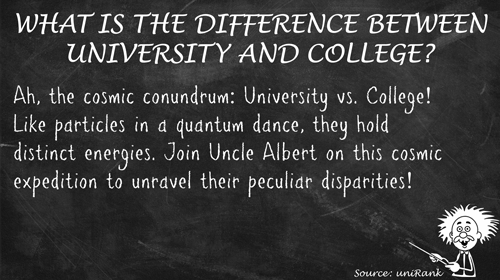 College vs. University: what is the difference? Is a university the same as a college? In the United States the terms "college" and "university" are often used interchangeably but there are some specific differences between universities and colleges that are worth understanding and uniRank will try to explore.
College vs. University: what is the difference? Is a university the same as a college? In the United States the terms "college" and "university" are often used interchangeably but there are some specific differences between universities and colleges that are worth understanding and uniRank will try to explore.
History and Academic Structure
The term "college" comes from the Latin word "collegium," which means a group of people joined together for a particular purpose. Historically, colleges were institutions that offered higher education to students in specific fields such as theology, law, medicine or philosophy. The first colleges in the United States were founded in the 17th century and were often affiliated with religious organizations. They were primarily designed to train ministers, lawyers and other professionals.Over time, the definition of a college has broadened to include institutions that offer undergraduate programs in a wide range of fields, including liberal arts, sciences, engineering and business. In contrast, a university is an institution that offers a broader range of programs, including undergraduate, graduate and professional degrees. Universities are often composed of multiple colleges or schools, each of which offers programs in a specific academic discipline.
Academic Programs
Universities generally offer a wider range of academic programs than colleges, including undergraduate, graduate and professional degrees. Universities often have a larger academic structure composed of multiple schools or colleges, each of which specializes in a specific field of study. For example, a university may have a school of business, a school of engineering, a school of education and a school of law. Each school may offer a range of undergraduate and graduate programs, as well as professional degrees such as law, medicine or dentistry.In contrast, colleges usually are more specialized and focus on undergraduate education and offer a limited range of academic programs in specific fields such as liberal arts, sciences or engineering. Some colleges also offer professional programs in fields such as nursing or education.
Faculty and Research
Universities generally have larger faculty and research resources than colleges. Universities often have a large number of faculty members who are specialists in their fields and engage in research, scholarship and creative activities. They may also have research centers and institutes that focus on specific areas of inquiry.In contrast, colleges usually have smaller faculties and fewer research resources. Faculty members at colleges are primarily focused on teaching undergraduate students, although some may engage in research or scholarly activities.
Student Body
Universities generally have larger student bodies than colleges. Universities attract students from a wide range of geographic locations and backgrounds and may offer a more diverse student body than colleges. Universities may also have more resources for student activities, clubs and organizations, as well as more extensive athletic programs.In contrast, colleges tend to have smaller student bodies and may offer a more intimate learning environment. Colleges may also have a more focused student body, with students who are primarily interested in a specific field of study.
Admissions and Selectivity
Both universities and colleges, depending on the country and its higher education system, can be selective in their admissions processes, but universities tend to be more selective than colleges. Universities receive a larger number of applications and may have more rigorous admissions standards than colleges. Universities may also require more extensive application materials, including essays, letters of recommendation and test scores.In contrast, colleges may have more flexible admissions standards and may place a greater emphasis on extracurricular activities, community service and other non-academic factors.
Cost and Financial Aid
Universities generally have higher tuition and fees than colleges due to their larger size and more extensive resources. However, universities may also offer more financial aid and scholarships to help offset the cost of attendance. In contrast, colleges may have lower tuition and fees but may offer fewer financial aid resources. Moreover, the cost of universities and colleges depends on the country where they are located. Some countries offer free higher education to their citizens and/or permanent residents."College" term trend and use in non-English speaking countries
In the United States, there has been a consistent trend of shifting higher education organizations' names from college to university in the last few years. College does not seem to be a term as popular as it was in the past among higher education institutions in the United States. The adoption of the term University seems to be preferred possibly due to its more prestigious connotation (i.e. marketing appeal), international recognition, wider academic breadth and structure and research focus.Lastly, in many non-English speaking countries, the term and concept of college are not known or used at all in a higher education contest. In those countries, most of the higher education organizations are known as universities, institutes, schools or academies.
Conclusion
In summary, universities and colleges differ in their history, academic structure, academic programs, faculty and research resources, student body size and composition, admission and selectivity criteria, cost and financial aid and geographical location.Ultimately, the choice between attending a university or college, which is once again a term mainly used in the United States, will depend on individual academic and career goals, as well as personal preferences and financial considerations. © uniRank
